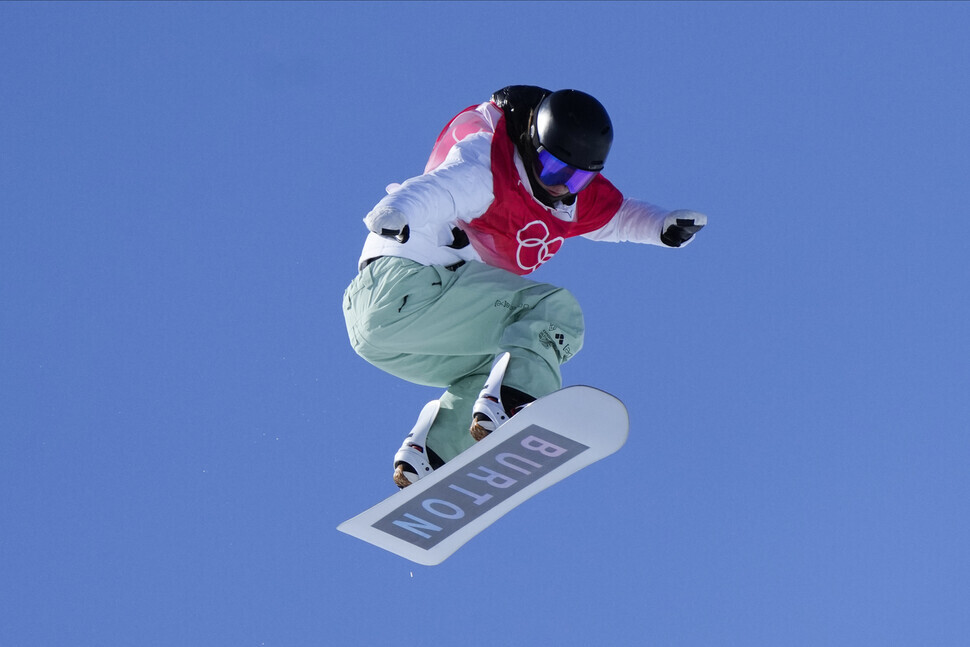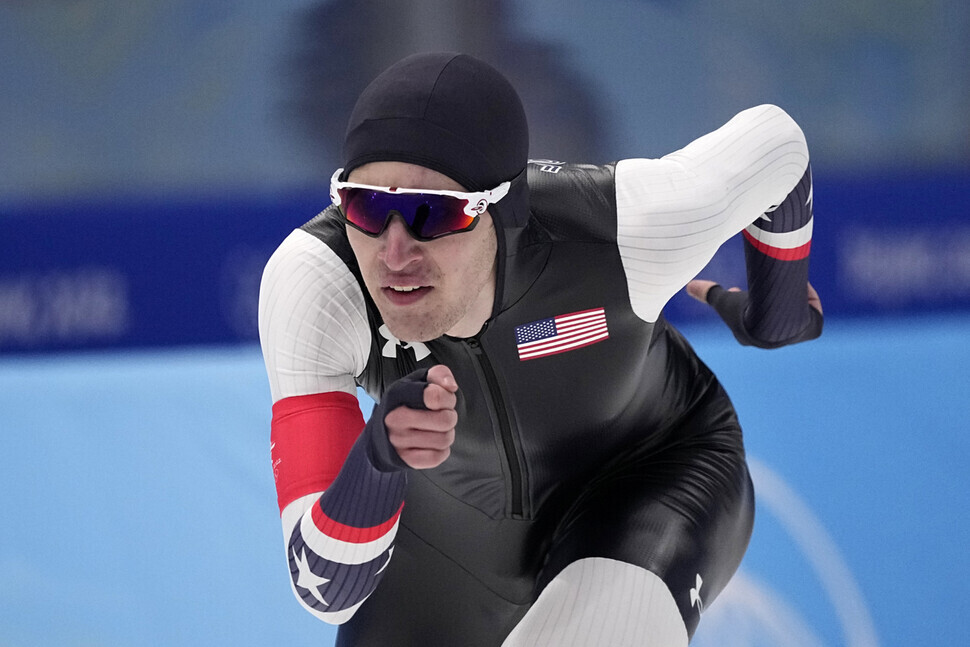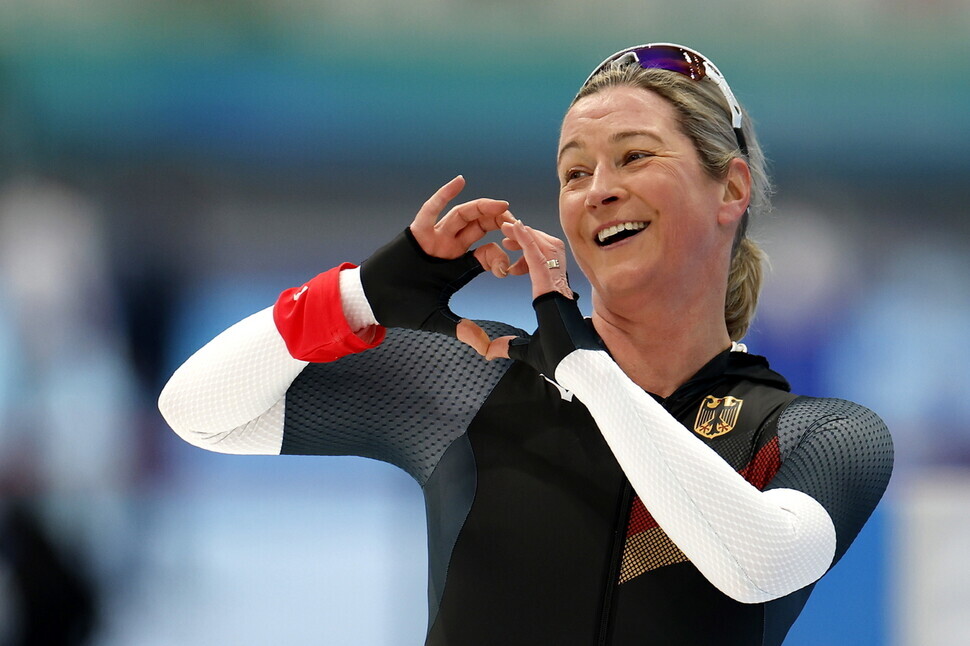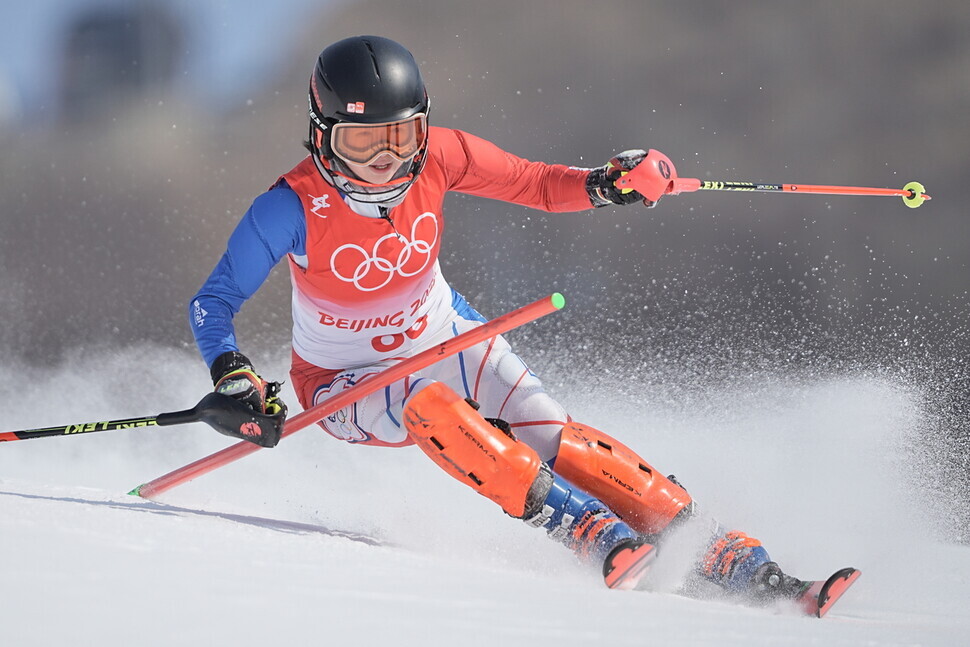hankyoreh
Links to other country sites 다른 나라 사이트 링크
These athletes prove Olympic spirit is about more than medals

Sometimes, an athlete deserves all the applause in the world just for getting themselves to the starting line. Such is the case for some participating in the 2022 Beijing Winter Olympics who managed to compete despite odds stacked against them. Their defiant spirit can’t be measured by the color of their medals or their rank, even if they came in last in their race. That’s because they exemplify what it means to be a true sportsperson, one who values process over results.
Born of a Hungarian mother and a Canadian father, 18-year-old snowboarder Kamilla Kozuback was diagnosed with Type 1 diabetes when she was 14. A rare disease found in children and teenagers that comprises 10% of all diabetes patients, Type 1 diabetes requires lifelong management through a rigid diet, regular blood sugar checks, and insulin shots.
Kozuback’s first reaction immediately following her diagnosis was to sigh and wonder if she would be able to keep snowboarding. The anxiety of possibly having to give up her dream overwhelmed her more than the pain from the illness. Nevertheless, two years after her diagnosis, Kozuback was able to compete in the 2020 Winter Youth Olympics for Canada and come in at eighth and ninth place at the big air and halfpipe events, respectively.
For the Beijing Olympics, Kozuback opted to represent team Hungary, and became the first Hungarian snowboarder to compete in the Winter Olympics. She took part in three events total, placing 28th out of 28 contestants in the women’s slopestyle qualification run on Feb. 5, 19th out of 22 in the halfpipe qualification run on Wednesday, and 17th out of 29 in the big air qualification run on Monday. Though she started out the Games at the tail end of the competition, her rank consistently improved with every event. Kozuback said she wants to inspire young Type 1 diabetes patients to keep on challenging themselves in sports.

Getting to the Olympics proved no easy task for 22-year-old US speedskater Casey Dawson as well. Three weeks before the Games began, he tested positive for COVID-19 and wasn’t able to join his teammates on their flight to Beijing. He took a staggering 45 COVID-19 tests in order to meet the Olympic requirement of four consecutive negative PCR tests to participate in the Games. As a result, he made it to Beijing 12 hours before his 1,500-meter race on Feb. 7.
Though he continued with his training, even doing push-ups during his flight, Dawson wasn’t in his best shape. To make matters worse, his baggage got lost in transit, so his skates didn’t make it to Beijing in time. He borrowed a pair of backup blades from a Latvian skater and participated in the race, placing 28th out of 29 skaters. It was an exhausting race. “Stepping to the [starting] line was the biggest thing for me,” Dawson said.

Claudia Pechstein of Germany finished the women’s 3,000-meter speedskating finals on Feb. 5 at 4:17.16 — 20th out of 20 skaters. A typical record for her rank, one might say, but there was something else surprising about her: Pechstein will turn 50 next week. The oldest ever female Winter Olympian, she competed in seven Olympic Games prior to Beijing.
Irene Schouten of the Netherlands, who won gold in the women’s 3,000-meter finals Pechstein came in last, was born in 1992 — the year Pechstein made her Olympic debut at the Albertville Winter Olympics. She’s had perfect attendance at Winter Olympics for the past 30 years, except when she skipped the Vancouver Olympics after a 2-year ban for blood doping.
Pechstein has written speedskating history by winning nine Olympic medals in her career — five golds, two silvers, and two bronzes. In 2012, she even made a surprise appearance as a cycling contestant at the London Olympics. After coming in last in the Feb. 5 race, Pechstein said that the day’s result wasn’t so important — she was in Beijing to compete in her eighth Olympic Games, and she was proud of herself.

Twenty-year-old Taiwanese alpine skier Lee Wen-Yi completed both of her runs down the slope with a total time of 2:46.04 during the women’s slalom on Wednesday, placing 50th out of 50 contestants who managed to finish both runs. Double Olympic alpine ski champion Mikaela Shiffrin had fallen and been disqualified on her first run down the same slope.
Though Lee was the slowest to finish the event, with a 61.06-second time difference compared with the record set by the gold medalist, that she finished a race 32 skiers failed to complete was an achievement in itself.
By Park Kang-su, staff reporter
Please direct questions or comments to [english@hani.co.kr]

Editorial・opinion
![[Column] How opposing war became a far-right policy [Column] How opposing war became a far-right policy](https://flexible.img.hani.co.kr/flexible/normal/500/300/imgdb/original/2024/0702/5017199091002075.jpg) [Column] How opposing war became a far-right policy
[Column] How opposing war became a far-right policy![[Editorial] Korea needs to adjust diplomatic course in preparation for a Trump comeback [Editorial] Korea needs to adjust diplomatic course in preparation for a Trump comeback](https://flexible.img.hani.co.kr/flexible/normal/500/300/imgdb/original/2024/0702/9717199086060096.jpg) [Editorial] Korea needs to adjust diplomatic course in preparation for a Trump comeback
[Editorial] Korea needs to adjust diplomatic course in preparation for a Trump comeback- [Editorial] Silence won’t save Yoon
- [Column] The miscalculations that started the Korean War mustn’t be repeated
- [Correspondent’s column] China-Europe relations tested once more by EV war
- [Correspondent’s column] Who really created the new ‘axis of evil’?
- [Editorial] Exploiting foreign domestic workers won’t solve Korea’s birth rate problem
- [Column] Kim and Putin’s new world order
- [Editorial] Workplace hazards can be prevented — why weren’t they this time?
- [Editorial] Seoul failed to use diplomacy with Moscow — now it’s resorting to threats
Most viewed articles
- 110 days of torture: Korean mental patient’s restraints only removed after death
- 2[Editorial] Korea needs to adjust diplomatic course in preparation for a Trump comeback
- 3Nine dead in Seoul after car plows into pedestrians
- 4[Column] How opposing war became a far-right policy
- 5Korea to create dedicated population strategy ministry to combat low birth rate, aging society
- 6Samsung Electronics workers to go on first strike in company’s 55-year history
- 7[Editorial] Silence won’t save Yoon
- 8Son Heung-min’s father, brother accused of child abuse at football academy
- 9Dreams of a better life brought them to Korea — then a tragic fire tore them apart
- 10Japan is building a military meant for more than self-defense — and has the US to thank for it